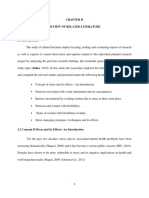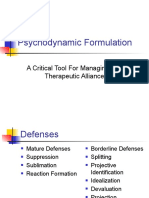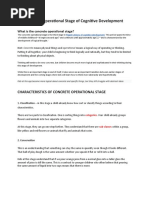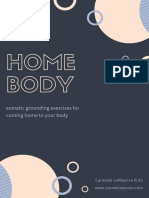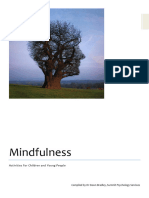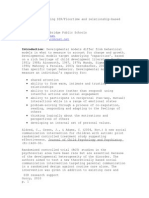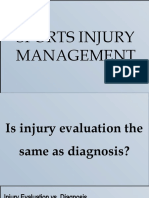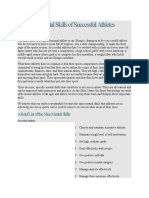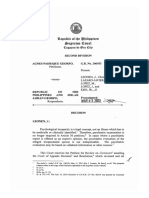0 ratings0% found this document useful (0 votes)
198 viewsStress: Causes and Effects of Stress Appropriate Stress Management Strategies Counterproductive Coping Strategies
Stress is the body's reaction to challenges or demands and can be positive (eustress) or negative (distress). Stress is caused by stressors like major life changes, everyday problems, and physical surroundings. The body responds to stress through the general adaptation syndrome which has three stages - alarm, resistance, and exhaustion. Appropriate stress management strategies include managing stressors, getting enough rest and sleep, exercising, and using relaxation methods. Maladaptive coping strategies should be avoided, such as substance abuse. Adaptive coping involves direct problem solving and maintaining emotional health.
Uploaded by
Kenn AlmazanCopyright
© © All Rights Reserved
Available Formats
Download as PPTX, PDF, TXT or read online on Scribd
0 ratings0% found this document useful (0 votes)
198 viewsStress: Causes and Effects of Stress Appropriate Stress Management Strategies Counterproductive Coping Strategies
Stress is the body's reaction to challenges or demands and can be positive (eustress) or negative (distress). Stress is caused by stressors like major life changes, everyday problems, and physical surroundings. The body responds to stress through the general adaptation syndrome which has three stages - alarm, resistance, and exhaustion. Appropriate stress management strategies include managing stressors, getting enough rest and sleep, exercising, and using relaxation methods. Maladaptive coping strategies should be avoided, such as substance abuse. Adaptive coping involves direct problem solving and maintaining emotional health.
Uploaded by
Kenn AlmazanCopyright
© © All Rights Reserved
Available Formats
Download as PPTX, PDF, TXT or read online on Scribd
You are on page 1/ 35
STRESSCauses and Effects of Stress
Appropriate Stress Management Strategies
Counterproductive Coping Strategies
What is Stress?
• Stress is a reaction of the body
and mind to unkind or
challenging life incidents such as
tense feelings, worry and
discomfort.
• It is the imbalance between the
demand from the environment
and the person’s ability to cope
can trigger feelings of anxiety.
What is Eustress and
Distress?
Eustress, the positive stress
is beneficial in attaining best
performance. Distress, the
negative stress, is
detrimental to performance.
What causes stress?
STRESSOR is a stimuli, event or situation that causes
stressful situations, which are seen as risk to the well-
being of a person. The body responds to stress by
secreting hormones that prepares the body to respond
to the situation. Stress response is not harmful to the
body; however, frequent activation of stress response
has negative consequences on the body.
Classification of Stress
Acute stress , the most common form, arises from recent
past and foreseen difficulties.
Cumulative stress is a series that has built up. Several
individuals ignore the signs early and end up accumulating
them.
Chronic stress is a form of stress that is recurring. It is a
prolonged stress that is dangerous and can lead to sever
health problems.
What are the different
sources of stress?
Major Life Changes
Majority of stressors are key life changers that
influence an individual’s family and social life. These
stressful changes threaten one’s sense of security and
self esteem. Changes due to stressful events in life
endanger an individual’s sense of safety and
confidence. Some examples include death od a loved
one, losing a job, etc.
Everyday Problems
The stress or “hassles” we encounter everyday or
occasional petty incidents are part of this group.
Examples of these stressors include dressing
concerns, misplacing or losing things, too much
things in mind or physical appearance. These
maybe insignificant but they accumulate as it
happens daily.
Physical Surroundings
The immediate surroundings affect the level of day-to-
day stress (i.e., crowded transportation in going to
school or workplace, street walks with foul odors, or
unbearable weather conditions.). Noise is also one of the
overlooked factors causing stress especially if you are
residing near airports, train rail tracks, or factories with
loud machines. People in depressed, dangerous or
polluted areas also suffer high stress levels.
Other Stressors
Other stressors involving teenagers include
worrying about their future, conflicts and
disagreement with the family members,
friends and other people, among others.
Sometimes, teenagers who cannot manage
their issues resort to alcohol and prohibited
drug.
Common Reactions during Stressful Situation
PHYSICAL SIGNS EMOTIONAL SIGNS BEHAVIORAL SIGNS PSYCHOLOGICAL
SIGNS
• Muscle Tension • Anger, irritability • Loss of Appetite • Constantly
• Headache • Impatience • Overeating irritable with
• Pounding heart • Nervousness • Drug abuse other people
• Shortness of • Forgetfulness • Sleep problems • Feeling of being a
breath • Inability to • Restlessness failure
• Increased concentrate • Hurrying and • Difficulty in
sweating • Negative thinking talking fast making decisions
• Dry mouth • Excessive • Criticizing others • Loss of interest in
• Skin rash worrying • Reckless other people
• Grinding teeth • Loss of interest behaviour • Having a hard
• Nail biting • Self-criticism • fidgeting time to
• Frequent crying concentrate
What is General
Adaptation
Syndrome?
The General Adaptation Syndrome
GAS is the three-stage process that
describes the physiological changes
the body goes through when under
stress.
The General Adaptation Syndrome
Alarm Stage is the phase where the brain deciphers the
distress and instantly deals with it. It is also known as “fight
or flight”.
Resistance Stage is the process where the stress is being
resolved after meeting its demands then the body goes back to
normal afterwards.
Exhaustion Stage develops when stress recurs until it
becomes chronic and reaches this final stage. Stress level
peaks and plateaus then develops health risk that cause high
blood pressure, stomach and heart problems.
When the body reacts to a stressor, it has an automatic
mechanism that copes with stress for survival. This response
is also known as “fight or flight”. The response initially
release the adrenaline hormone resulting to more body
strength. The heart beats fast, blood rush to the brain and
muscles, then the breathing gets faster which gives body cells
more oxygen. This sudden series of hormonal changes and
body responses allows a person to fight threat or go on a
flight to safety. The body is in “attack mode” throughout
the fight or flight response, concentrating on the immediate
threat but not always producing appropriate responses.
Appropriate Stress
Management Strategies
How can stress be managed?
Manage stressors
An important approach to minimize stress is to
lessen the stressors. Stressors cannot be
eliminated but it can be avoided. Being burdened
with too much work could be prevented by
prioritizing and time management. Refrain from
unnecessary matters and focus on the important
ones.
Rest and Sleep
A very helpful way of reducing stress and relieving
tension is having a good amount of rest and sleep.
Grown-ups normally need 7 to 9 hours of comfortable
sleep every night. It also helps taking 15 to 30 minutes
daytime nap. Stress and exhaustion are best countered
by a sound and relaxed body.
Exercise
Exercising naturally relieves the body from effects
of stress. An aerobic workout stimulates
hormones, wears down tight muscles and gives a
nicely tired but stress-free condition. Exercise has
also been known to help to secrete endorphins,
which help the body relax.
Use Relaxation methods in coping with
stress.
Numerous types of relaxation methods can be done to counter
the adverse effects of stress. Some of these are progressive
relaxation, deep-breathing, meditation and creative
visualization.
1. Progressive relaxation uses the body’s feedback
mechanism in reducing muscle tension, a common
indicator of stress. It is essential to learn and practice
exercises that can relax tense muscle.
2. Deep breathing tells the brain to calm down and relax,
relieving the stress.
3. Meditation is a technique that temporarily “tunes out”
the world, disregards outside disturbances, and provides
inner peace. A relaxed physical and mental state wipes out
accumulated stress.
4. Visualization uses imagination to relax and reduce
stress (i.e. creating a pleasing image in your mind)
Counterproductive
Coping Strategies
What is coping?
Coping is defined as the “capacity
to respond and recover from
something stressful. It is the
conscious response to
psychological stress in an attempt
to balance mental and emotional
conditions. It includes how to
behave, thinking of ideas and
controlling emotions to minimize
or tolerate stressful events
Coping Styles
Adaptive coping involves direct confrontation and
prevention of stress.
Maladaptive coping is a counterproductive mechanism
that includes the use of alcohol and drugs.
Instrumental coping focuses on approaches that tackle the
problem to reduce stress of a particular situation.
Emotion-focused coping deals with nurturing the
emotional health through the stressful period.
Coping Styles
Active coping comprise the recognition of the stressor
to lessen its adverse consequences.
Avoidant coping ignore the issue or deny the
problem. Examples are alcohol intoxication, sleep and
isolation
Coping Strategies
Time management requires
planning a schedule ahead and
sticking with it. This helps in
avoiding cramming and things
pilling up. Success in planning
builds self-respect.
Coping Strategies
Sharing and talking about
problems with someone-a friend,
teacher or family member- to
relieve stress. Other people with
“bird’s eye view” or those who can
see problems from a distance
usually have clearer answers.
Coping Strategies
Using adrenaline-raised
energy for simple tasks like
cleaning the house or the car
redirects how the body reacts
from stress.
Coping Strategies
Being at ease lying or
sitting down while
emptying the mind with
upsetting ideas, listening to
gentle music or imagining
being in a quiet place can
relieve stress.
Coping Strategies
Having a good laugh
with friends or family,
watching different
movies or going to
funny places after a
stressful day
Some specific coping strategies
Humor. Look at the funny side of a problem. “positive
reframing” is believed to relief small flops.
Seek support. In the course of a stressful event, support
from the family members or friends keep emotional health
balance.
Problem-solving it is helpful mechanism that aims to
pinpoint the source of the problem and determine solutions.
This is often helpful in work conditions.
Some specific coping strategies
Relaxation. Unwinding events or calming skills help
manage stress and enhance overall coping.
Physical recreation. Regular exercises like yoga,
meditation and muscle relaxation are helpful in handling
stress.
Adjusting expectations. Accepting different results of
situations in life may help in adjusting the stress associated
with any given change or outcome.
Some specific coping strategies
Venting. An expressing-type of coping technique by
voicing out strong sentiments with friends and family.
Moderate venting can be beneficial but pondering the
negative may end up to edgy relations over time.
You might also like
- CHAPTER 1 - Introduction To Motivation and EmotionNo ratings yetCHAPTER 1 - Introduction To Motivation and Emotion22 pages
- Dr. Robert Epstein's Stress Management Inventory0% (2)Dr. Robert Epstein's Stress Management Inventory3 pages
- Organization and Management of Sports EventsNo ratings yetOrganization and Management of Sports Events23 pages
- Teaching Teachers About Emotion Regulation in The ClassroomNo ratings yetTeaching Teachers About Emotion Regulation in The Classroom12 pages
- Developmental Theories: The Psychoanalytic ViewpointNo ratings yetDevelopmental Theories: The Psychoanalytic Viewpoint5 pages
- Instant ebooks textbook (Ebook) The Adolescent Psychotherapy Progress Notes Planner 5th Edition by Arthur E. Jongsma && L. Mark Peterson && William P. McInnis && David J. Berghuis & L. Mark Peterson & William P. McInnis & David J. Berghuis ISBN 9781118816646, 1118816641, B079WFBN1Q download all chapters89% (9)Instant ebooks textbook (Ebook) The Adolescent Psychotherapy Progress Notes Planner 5th Edition by Arthur E. Jongsma && L. Mark Peterson && William P. McInnis && David J. Berghuis & L. Mark Peterson & William P. McInnis & David J. Berghuis ISBN 9781118816646, 1118816641, B079WFBN1Q download all chapters67 pages
- Piaget's Theory of Cognitive DevelopmentNo ratings yetPiaget's Theory of Cognitive Development12 pages
- The Concrete Operational Stage of Cognitive Development0% (1)The Concrete Operational Stage of Cognitive Development3 pages
- Divorce and Separation Eced PresentationNo ratings yetDivorce and Separation Eced Presentation20 pages
- A Constuctivist Grounded Theory Approach To BrainspottingNo ratings yetA Constuctivist Grounded Theory Approach To Brainspotting129 pages
- Children With Mental Disorders: Making Sense of Their Needs and The Systems That Help ThemNo ratings yetChildren With Mental Disorders: Making Sense of Their Needs and The Systems That Help Them24 pages
- Martin, A. J., Marsh, H. W., Williamson, A., y Debus, R. L. (2003) - Self-Handicapping, Defensive Pessimism, and Goal Orientation. A Qualitative Study of University Students.No ratings yetMartin, A. J., Marsh, H. W., Williamson, A., y Debus, R. L. (2003) - Self-Handicapping, Defensive Pessimism, and Goal Orientation. A Qualitative Study of University Students.34 pages
- Response Scale: 1 - (Strongly Disagree) 4 - (Strongly Agree)No ratings yetResponse Scale: 1 - (Strongly Disagree) 4 - (Strongly Agree)2 pages
- Addiction Treatment Homework Planner (PracticePlanners) 5th Edition – Ebook PDF Version all chapter instant download100% (3)Addiction Treatment Homework Planner (PracticePlanners) 5th Edition – Ebook PDF Version all chapter instant download41 pages
- Immediate download Building Resilience in Students Impacted by Adverse Childhood Experiences 1st Edition Victoria E. Romero ebooks 2024100% (7)Immediate download Building Resilience in Students Impacted by Adverse Childhood Experiences 1st Edition Victoria E. Romero ebooks 202450 pages
- A Person in Great Pain Longs For Relief: I Want To Be A DoctorNo ratings yetA Person in Great Pain Longs For Relief: I Want To Be A Doctor38 pages
- Download The Early Childhood Education Intervention Treatment Planner Practice Planners 1st Edition Arthur E. ebook All Chapters PDF100% (1)Download The Early Childhood Education Intervention Treatment Planner Practice Planners 1st Edition Arthur E. ebook All Chapters PDF68 pages
- What Is Maslows Hierarchy of Needs 4136760No ratings yetWhat Is Maslows Hierarchy of Needs 41367606 pages
- Freud and Erikson's Approaches To Psychoanalytic Theory - Differences & Analysis - Video & Lesson TranscriptNo ratings yetFreud and Erikson's Approaches To Psychoanalytic Theory - Differences & Analysis - Video & Lesson Transcript3 pages
- Original Performance With The Use of MediaNo ratings yetOriginal Performance With The Use of Media21 pages
- Maladaptive Patterns of Behavior A. Anxiety67% (3)Maladaptive Patterns of Behavior A. Anxiety19 pages
- Nine Mental Skills of Successful AthletesNo ratings yetNine Mental Skills of Successful Athletes5 pages
- (2011) Academic Bullying in Social Work Departments - The Silent EpidemicNo ratings yet(2011) Academic Bullying in Social Work Departments - The Silent Epidemic29 pages
- Interpersonal Psychotherapy: Introduction and Overview100% (1)Interpersonal Psychotherapy: Introduction and Overview22 pages
- Revista Pistis & Praxis: Teologia e Pastoral 1984-3755No ratings yetRevista Pistis & Praxis: Teologia e Pastoral 1984-375517 pages
- Homeopathic Remedy Pictures Gothe Drinnenberg.04000 - 1 PDFNo ratings yetHomeopathic Remedy Pictures Gothe Drinnenberg.04000 - 1 PDF6 pages
- CHAPTER 1 - Introduction To Motivation and EmotionCHAPTER 1 - Introduction To Motivation and Emotion
- Teaching Teachers About Emotion Regulation in The ClassroomTeaching Teachers About Emotion Regulation in The Classroom
- Developmental Theories: The Psychoanalytic ViewpointDevelopmental Theories: The Psychoanalytic Viewpoint
- Instant ebooks textbook (Ebook) The Adolescent Psychotherapy Progress Notes Planner 5th Edition by Arthur E. Jongsma && L. Mark Peterson && William P. McInnis && David J. Berghuis & L. Mark Peterson & William P. McInnis & David J. Berghuis ISBN 9781118816646, 1118816641, B079WFBN1Q download all chaptersInstant ebooks textbook (Ebook) The Adolescent Psychotherapy Progress Notes Planner 5th Edition by Arthur E. Jongsma && L. Mark Peterson && William P. McInnis && David J. Berghuis & L. Mark Peterson & William P. McInnis & David J. Berghuis ISBN 9781118816646, 1118816641, B079WFBN1Q download all chapters
- The Concrete Operational Stage of Cognitive DevelopmentThe Concrete Operational Stage of Cognitive Development
- A Constuctivist Grounded Theory Approach To BrainspottingA Constuctivist Grounded Theory Approach To Brainspotting
- Children With Mental Disorders: Making Sense of Their Needs and The Systems That Help ThemChildren With Mental Disorders: Making Sense of Their Needs and The Systems That Help Them
- Martin, A. J., Marsh, H. W., Williamson, A., y Debus, R. L. (2003) - Self-Handicapping, Defensive Pessimism, and Goal Orientation. A Qualitative Study of University Students.Martin, A. J., Marsh, H. W., Williamson, A., y Debus, R. L. (2003) - Self-Handicapping, Defensive Pessimism, and Goal Orientation. A Qualitative Study of University Students.
- Response Scale: 1 - (Strongly Disagree) 4 - (Strongly Agree)Response Scale: 1 - (Strongly Disagree) 4 - (Strongly Agree)
- Addiction Treatment Homework Planner (PracticePlanners) 5th Edition – Ebook PDF Version all chapter instant downloadAddiction Treatment Homework Planner (PracticePlanners) 5th Edition – Ebook PDF Version all chapter instant download
- Immediate download Building Resilience in Students Impacted by Adverse Childhood Experiences 1st Edition Victoria E. Romero ebooks 2024Immediate download Building Resilience in Students Impacted by Adverse Childhood Experiences 1st Edition Victoria E. Romero ebooks 2024
- A Person in Great Pain Longs For Relief: I Want To Be A DoctorA Person in Great Pain Longs For Relief: I Want To Be A Doctor
- Download The Early Childhood Education Intervention Treatment Planner Practice Planners 1st Edition Arthur E. ebook All Chapters PDFDownload The Early Childhood Education Intervention Treatment Planner Practice Planners 1st Edition Arthur E. ebook All Chapters PDF
- Freud and Erikson's Approaches To Psychoanalytic Theory - Differences & Analysis - Video & Lesson TranscriptFreud and Erikson's Approaches To Psychoanalytic Theory - Differences & Analysis - Video & Lesson Transcript
- (2011) Academic Bullying in Social Work Departments - The Silent Epidemic(2011) Academic Bullying in Social Work Departments - The Silent Epidemic
- Interpersonal Psychotherapy: Introduction and OverviewInterpersonal Psychotherapy: Introduction and Overview
- Revista Pistis & Praxis: Teologia e Pastoral 1984-3755Revista Pistis & Praxis: Teologia e Pastoral 1984-3755
- Homeopathic Remedy Pictures Gothe Drinnenberg.04000 - 1 PDFHomeopathic Remedy Pictures Gothe Drinnenberg.04000 - 1 PDF



